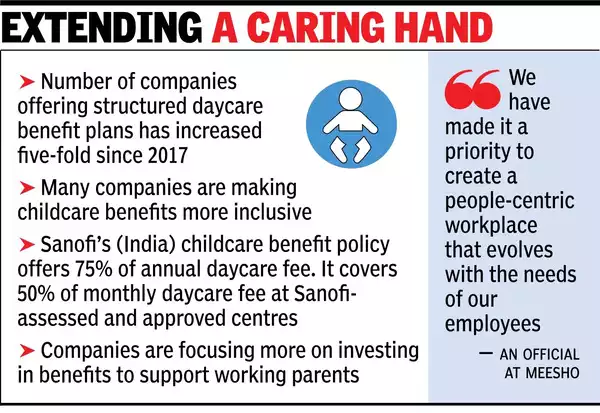Companies boost childcare benefits for employees

NEW DELHI: With Children’s Day just behind us, India Inc has a timely opportunity to assess the progress of its childcare and parental policies, especially since these benefits became mandatory in 2017. Increasingly, companies are budgeting for childcare/daycare expenses as part of the HR policies.
The number of companies offering structured daycare benefit plans has surged five-fold since then, with prevalence rising from 30% to 90% over the past two years, says a survey shared exclusively with TOI. Along with increased budgets and offerings, many companies are also making childcare benefits more inclusive. This reflects a broader shift towards supporting all employees in balancing work and family responsibilities.
The daycare support programme for employees is mandated as per the The Maternity Benefit (Amendment) Act of 2017, which says employers with 50 or more employees must provide a creche facility.
“Daycare benefit is no longer just a policy on paper. Companies are going beyond legal requirements to improve employee engagement by supporting parents with extended daycare benefits, such as creches near home (or flexible daycare options), increased corporate funding or subsidies for daycare fees and expanding these benefits to all working parents, not just mothers. From almost 85% of the surveyed companies not allocating funds or offering this benefit in 2017, now a small number – only 17% – do not have an allocated daycare budget,” Ketika Kapoor, founder, Proeves, one of the largest aggregator and booking platform for daycares/preschools, told TOI.

In 2022, around 70% of the surveyed companies activated the daycare benefit programme to get working parents back to office (as part of return to office campaigns). The survey studied about 52 companies across sectors of FMCG, BFSI, manufacturing, services and IT/ITES.
Surabhi Kaul, people & culture director, Sanofi (India) says: “Our childcare benefit policy not only offers 75% of the annual daycare fee, it also covers 50% of the monthly daycare fee at Sanofi-assessed and approved centres. Parents can avail of this benefit for up to three children, aged six months to 10 years as against the mandated six-year cap for childcare provision. Additionally, Sanofi’s equal parental leave not only grants time-off to new parents of any gender, it also offers paternity leave of 14-weeks, which is above industry norms.”
Currently, majority of surveyed companies allocated between 0-5% of their total HR budget to daycare-related expenses. While these budgets may be modest, what’s significant is the growing focus by companies on investing in these mature benefits to support working parents. This shift could also signal a broader change in priorities, moving beyond the millennial-centric trends that have dominated startup culture in recent years.
Ashish Kumar, CHRO at Meesho, said, “We have made it a priority to create a people-centric workplace that evolves with the needs of our employees. Our Childcare Benefits and Parental Wellness Programme exemplifies this commitment, offering gender-neutral support based on caregiving roles.”
Further, Fidelity Investments is supporting associates through a convenient, inclusive, and flexible daycare policy covering children up to age six and available to associates of all genders, Narayanan Vijayaraghavan, head – compensation and benefits, of the company said.







